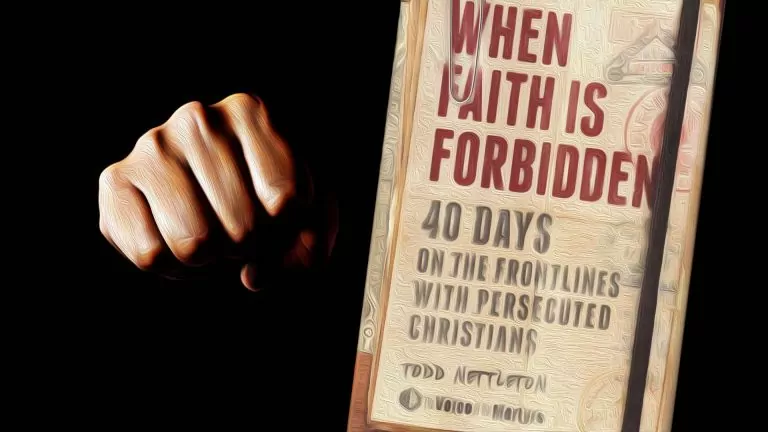What follows is an excerpt from Todd Nettleton’s “When Faith is Forbidden: 40 Days on the frontlines with persecuted Christians” and took place near Allawa, Ethiopia, in October of 2005.
*****
The nickname “Haji” is a term of respect in the Muslim world, bestowed on those who have completed their haji pilgrimage to Mecca, one of Islam’s five pillars. It’s not commonly combined with the title pastor!
We met “Pastor Haji” at his grass-roofed house in the southern part of Ethiopia, an area where a rising tide of radical Islam was threatening the church and Christian believers. Outside the house, there was a burn mark on the wall. One week prior, radical Muslims tried to set fire to Haji’s house. Thankfully, he put out the fire.
As we sit, drinking orange sodas Haji graciously offered us, we can look up to see sunlight streaming through holes in the tightly packed grass roof. The holes are the result of neighborhood Muslims throwing stones onto the house, trying to pressure Haji and his family to leave the area or return to Islam. Thankfully, none of his family was injured by falling stones.
Haji understands the hatred of radical Muslims. He used to be one of them! He was so devout, he was sent to Saudi Arabia for special training.
As we stood outside the hut, Haji had his arm around the evangelist that brought us to meet him. Nodding his head toward the evangelist, he said five words I will never forget.
“I used to beat him.”
What?
“I used to beat him.” Haji went on to tell us that he was the leader of a radical Islamic group of young men, and part of their holy duty to their Prophet was attacking and harassing Christians. One of those they attacked was this very evangelist, the man now smiling with Haji’s arm draped loosely across his shoulders.
In spite of beatings, the evangelist refused hatred for his attackers. Instead, he showed them love and offered them blessings and good news. Haji had no explanation for such a response. How could a man you were beating show love to you? How could he not grow angry and fight back?
Eventually, Haji’s heart was won by the gospel message and the love of the Christian man he was attacking. He left the vitriol and violence of Islam for peace beyond his understanding.
Islamic friends were not happy with his decision. Haji would spend a year in jail. He would face some of the same tactics he’d used against Christians. Now he was facing rocks through his roof and attempts to burn down his house. But he would not give up his faith in Jesus.
Once again, I’m struck by the joy the men and women of our persecuted Christian family possess. Haji is a happy man. His smile is huge. His laugh comes easily and often. This is not a man who lives in constant fear, though the threats against him are real and constant. This is a man having fun, living an adventure, and serving a great King.
Haji is having kingdom impact. Who better to talk to Muslims about Jesus than a former Muslim, one who completed the hajj, one so devout he was sent to Saudi Arabia for special training? Who better to spell out the differences between a god who will weigh out your good deeds and bad deeds to see whether you’ve earned the right to enter paradise, and a God who knows our good deeds can never outweigh our sinfulness, and so sent His own Son to pay the price for our bad deeds and purchase our entrance to heaven with His own blood?
Haji’s story is not unique. One of the church’s first great missionaries was a man so zealous for his religion he asked for the assignment of hunting down men and women who didn’t follow their teachings. Then that man ran into the very One he was persecuting, and was forever changed.
One of our VOM contacts in Colombia has a saying: “A racehorse can run just as fast in either direction.” One who is zealous for sin will often become zealous for Christ. One who beat Christians might eventually accept beatings with joy in service to his King.
It’s easy for us to look at someone with holier-than-thou religious eyes and write them off spiritually. He is so hard-hearted nothing could reach him. She is so trapped in sin she can never get out. But the testimony of Pastor Haji—and the apostle Paul—is that none of us is beyond the reach of God’s grace and mercy. And those saved from much are often the racehorses that run fastest for Christ and furthest to reach others for Him.
“I used to beat him,” said the pastor. Said the persecuted Christian. Said the kingdom worker. With a smile.
This was taken from “When Faith is Forbidden: 40 Days on the Frontlines with Persecuted Christians” by Todd Nettleton & The Voice of the Martyrs (©2021), published by Moody Publishers (www.MoodyPublishers.com) and used by permission. Each chapter is a story of a Christian who shared God’s good news with those around them, come what may. They shared that good news despite the dangers because they knew that the relatives trying to silence them, the mob trying to intimidate them, or even the policemen coming to arrest them, all needed what God had already given to them. This is a story of Christians far braver than we, but more importantly, it is the story of the good God who sustained them. In a few instances, He did so by way of big miracles: Muslims with no access to the Bible are reached in their dreams, police tossing a house find a lost sewing needle but miss the three large boxes of Bibles in the middle of the room. In others, the miracles were maybe less spectacular, but exactly what was needed: a woman whose husband was murdered is able to forgive the murderers, a drug addict who turns to God is instantly freed from his addiction. These persecuted Christians want us to understand that for God’s people, persecution is to be expected (John 15:18-21) but it need not be feared because our God is greater than the world and what we might have to suffer is nothing compared to what we have gained in Him. A longer excerpt of the book can be found here and you can watch the book trailer below.











